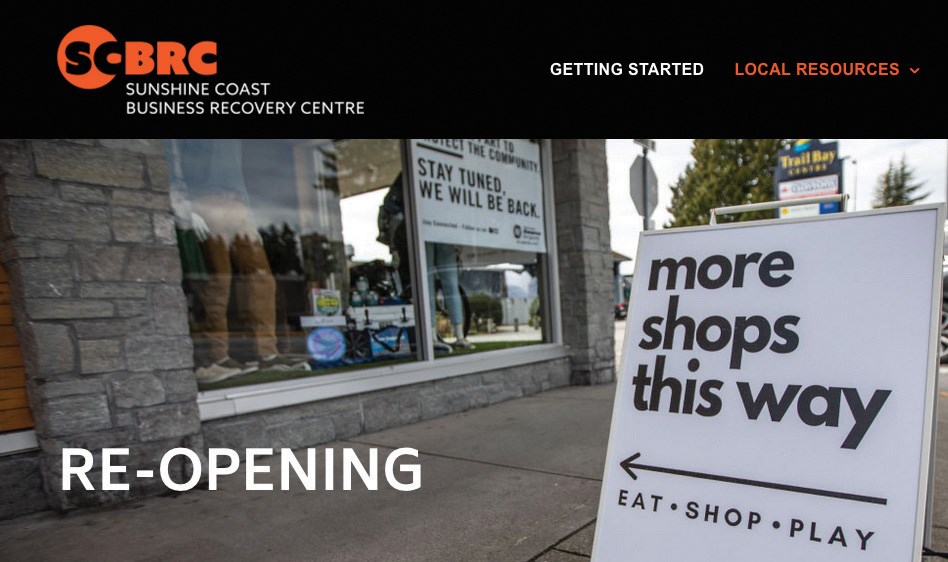The Sunshine Coast Regional Economic Development Organization (SCREDO) and Community Futures Sunshine Coast have launched the Sunshine Coast Business Recovery Centre (SCBRC).
“The recovery centre is intended to be a one-stop online resource for local business owners adapting to new realities in our local markets since the onset of the global pandemic,” SCREDO and Community Futures said in a joint release.
“Some of the resources and supports available include: local bridge financing, revising business plans, interpreting new operating guidelines, reducing commercial rent, exploring alternate sales channels, and succession planning.”
The Business Recovery Centre grew out of the work of a task force set up in late March by a coalition of local finance and business support organizations.
At the time, Community Futures executive director Janice Iverson told Coast Reporter that the recovery path for local businesses could be similar to the experience of B.C. communities hit by floods or wildfires in recent years.
“Each business has an individual recovery plan that they need to design. Some may be simple and some might be complex and longer,” she said.
“We do know that the hard work pretty much begins when we are given permission to reopen our doors. That becomes the beginning of a new beginning – that’s what we learned in the wildfires.”
During a taping of Eastlink Community TV’s Talk to Your Local Government on May 7, local government leaders talked about how they see their role in helping local businesses recover.
Gibsons Mayor Bill Beamish, Sechelt Mayor Darnelda Siegers, Sunshine Coast Regional District (SCRD) chair Lori Pratt and shíshálh Nation Chief Warren Paull all said they plan to work closely with groups like SCREDO, Community Futures, the Chambers of Commerce and the Sechelt Downtown Business Association.
Beamish also said he wants to look at ways to make it easier for businesses like stores and restaurants to operate under new guidelines that may require more space.
“For example in Lower Gibsons, I’d like to see us open up our sidewalks to enable the businesses to flow onto the sidewalk a little bit more so you get more of an open air market if they want to do that,” he said.
“I’ve actually thought maybe making Gower Point Road one-way into town and [some] parking spaces can maybe become commercial space for one month, allowing people to flow into there. Enabling businesses to attract people.”
Siegers said local governments need to be open to other alternate business models as well. “We can’t just assume that all stores or restaurants could open up and do takeout or curbside pick-up and it would actually work for them.
“They’re going to be putting plans together and coming to us and I think what I’m hearing from everybody is that we will do what we need to do to provide assistance as possible. Doing away with some of the [existing] rules if we can,” Siegers said.
She added that will also mean working with agencies and provincial ministries that regulate sectors like restaurants and pubs.
The shíshálh Nation is a major commercial property manager on the Coast and Paull said as work continues on completion of the next phase of the Tsain-Ko Centre, the Nation is looking into how the businesses might need to change the way they use the space.
“We are definitely having conversations around how all that looks,” said Paull. “Are we going to be allowing [the businesses] to get out on the tarmac as it were? Maybe rearranging traffic patterns and doing all those other things that are necessary.”
The SCRD’s Pratt said because the regional district has less of a role in business regulation than a municipality, it will be taking more of an advocacy role.
“Staying in contact with the businesses community and finding out what they do need from us … and finding out where we need to advocate for them,” said Pratt.
That advocacy, she said, could come as part of the regular conference calls they’re having with provincial ministers, direct outreach to the local MLA and MP and letters to seniors governments.
The Business Recovery Centre, which is entirely online, started offering services on May 11 at www.scbrc.ca. Staff can also be reached by phone at 604-747-4696 or email at [email protected]
SCREDO and Community Futures said as the pandemic restrictions are eased the Business Recovery Centre could also open an office to allow for in-person meetings and workshops.



